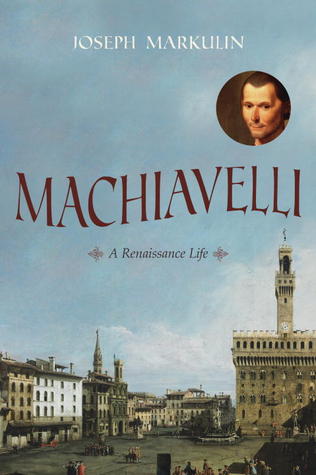
Blurb
This epic piece of storytelling brings the world of fifteenth-century Italy to life as it traces Machiavelli’s rise from young boy to controversial political thinker. The often-vilified Renaissance politico and author ofThe Prince comes to life as a diabolically clever, yet mild mannered and conscientious civil servant. Author Joseph Markulin presents Machiavelli’s life as a true adventure story, replete with violence, treachery, heroism, betrayal, sex, bad popes, noble outlaws, deformed kings, menacing Turks, even more menacing Lutherans, unscrupulous astrologers, untrustworthy dentists-and, of course, forbidden love.While sharing the stage with Florence’s Medici family, the nefarious and perhaps incestuous Borgias, the artists Leonardo da Vinci and Michelangelo, and the doomed prophet Savonarola, Machiavelli is imprisoned, tortured, and ultimately abandoned. Nevertheless, he remains the sworn enemy of tyranny and a tireless champion of freedom and the republican form of government.Out of the cesspool that was Florentine Renaissance politics, only one name is still uttered today-that of Niccolo Machiavelli. This mesmerizing, vividly told story will show you why his fame endures.
My Review
This is a BIG book; it’s more like two books put together as one. It sat on my shelf for a long time because I found it so intimidating. But I will say, when I finally started it, I was caught up in a lively, interesting story. As you might expect, the book began in Niccolo Machiavelli’s youth and ended with his death. Whew. He lived in an interesting time and I knew very little about him; if this book is any indication, what I knew was wrong. I thought he wrote “The Prince” using Cesare Borgia as a role model, but apparently not. (I haven’t read “The Prince” yet, but it’s worked its way up my reading list!). The Machiavelli of this book didn’t admire Cesare, except that he gave him grudging credit for all he achieved. But since Borgia’s intent was to crush Florence—or at least conquer it—he was more of a threat than a paragon, and someone to be watched with trepidation. But Borgia was only part of the story. We learn about Fra Girolamo Savonarola, the war between Florence and Pisa, a dizzying array of Medicis, as well as the stress between Florence as a republic and its subjugation under the Medici. I learned a lot, and at times the author put on his historian’s hat and gave us some important background (which I liked) before getting back to the story.
It wasn’t until he reached the age of thirty that Machiavelli began his career in the government; he was a secretary in the Chancery, a diplomat and ambassador, holding a position of confidence and importance, attached to foreign leaders like Borgia. When the Medici took over, he was degraded, then imprisoned, then worse. But that’s much later in the book. Along the way he made many friends and many enemies, and fell in love with Guiditta, a Jewish girl who slipped in and out of his life through no fault of her own (or his). It’s a violent time, and when cities fall to invaders, people get murdered right and left, and nothing is sacred, no wonder lovers get separated—especially lovers of different faiths.
The days after Don Micheletto’s assassination were anxious days for Niccolo. Since Guiditta left for Rome, he had received only one brief, coded, communication from Michelozzi—‘Everything under control.’ And then silence.
A week passed. Ten days. She promised she would come back. With Don Micheletto dead, the veil of evil had been lifted from Florence, and city absolved of her guilt. The real culprit had been made to pay for his crimes. Giuditta could come back now. But in the back of his mind, other arguments echoed, her other objections sounded: ‘What kind of a life do I have here? I’m not a woman like other Florentine women. I’m an outsider…’
I believe Guiditta is a made-up character, and an inordinate amount of energy is devoted to her relationship with Niccolo. However, she does serve to link many events in the story that might otherwise have been difficult to explain. There are a lot of people to keep track of and numerous episodes, and Guiditta helps break things up, so to speak, as well as give motivations to characters’ actions. After all, she has enemies, too. Niccolo is very kind to her, and she serves as a lifeline through his difficult times. My take-away is that Machiavelli does not necessarily deserve to be thought of as Machiavellian; he is hardworking, honest, and loyal to Florence. Perhaps his epithet is more appropriately applied to the times he lived in rather than himself. He has many ups and downs and manages to recover his influence at the end of his life, but by then he is a spent force and so was I. I had to plough through the last fifty pages or so, and was quite relieved when it was over. But I’m glad I read it, which is always a good thing.

Amazon.com: https://www.amazon.com/Machiavelli-Renaissance-Life-Joseph-Markulin/dp/1616148055